The British surrender at Yorktown on October 19, 1781 was a miracle of providential timing and intervention. It involved at least four major ingredients that had to come together in the face of potential disaster. The disasters included worthless paper money and the lack of an ability to support the troops. In addition, troops outside New York were freezing and had no food. The Pennsylvania regiment mutinied. The New Jersey line rebelled. Traitor Benedict Arnold, with the help of Tories, lawlessly ransacked homes. The Revolution appeared to be lost.
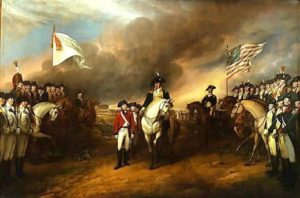 In the midst of these discouragements, the French arrived in late 1780. Then in January of 1781 defeated the British at Cowpens. Cornwallis chased he and his British prisoners but amazingly, in three consecutive instances, rivers were low when the colonial troops passed and then suddenly rose, stopping the British! It was seen as a miracle by both the Colonial and British troops! As a result of these interventions, faith in God began to rise and an amazing unity among all the militia units for the first time in the war occurred. No no longer did we refer to just individual state militias when Washington finally entered Williamsburg to lay siege to Cornwallis in Yorktown – it was an American army.
In the midst of these discouragements, the French arrived in late 1780. Then in January of 1781 defeated the British at Cowpens. Cornwallis chased he and his British prisoners but amazingly, in three consecutive instances, rivers were low when the colonial troops passed and then suddenly rose, stopping the British! It was seen as a miracle by both the Colonial and British troops! As a result of these interventions, faith in God began to rise and an amazing unity among all the militia units for the first time in the war occurred. No no longer did we refer to just individual state militias when Washington finally entered Williamsburg to lay siege to Cornwallis in Yorktown – it was an American army.
The second amazing providence was the blend of character in the various officers who led the battle on both sides. Good officers care for their troops, don’t put them in unnecessary harm, but also allow for boldness. Christian officers also note the Providence of God. However, bad character of officers is exhibited in pride where people want personal fame more than the honor of the cause and their country. At this final battle, the contrast in the British and American officers could not have been more clear!
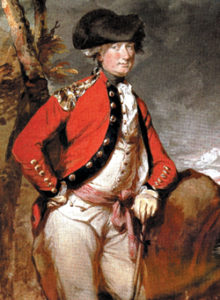 British officer Clinton, who was 51, and of noble heritage, relied more on that than his character. He was a liar and hated by the other officers. Charles Cornwallis, at 43 (right), originally siding with the colonies, once leading for the British, was given blame that was not deserved. He was thus motivated by jealousy and revenge. Banastre Tarleton, at only 27, was more of a terrorist than an officer. He butcherd soldiers, refusing to give any honor to a defeated enemy, provoking turmoil but building courage in colonial forces.
British officer Clinton, who was 51, and of noble heritage, relied more on that than his character. He was a liar and hated by the other officers. Charles Cornwallis, at 43 (right), originally siding with the colonies, once leading for the British, was given blame that was not deserved. He was thus motivated by jealousy and revenge. Banastre Tarleton, at only 27, was more of a terrorist than an officer. He butcherd soldiers, refusing to give any honor to a defeated enemy, provoking turmoil but building courage in colonial forces.
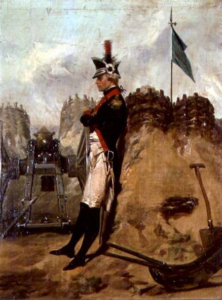 American Lt. Colonel Alexander Hamilton (left), at 26, was dedicated to the cause of liberty and prepared those under him, having studied artillery and war. Though he had a flare for fame, he kept it in check. He knew French and was able to communicate with them. Henry Knox was 31, chief of artillery, had excellent Christian character, and ended up serving under Washington as President. Nathaniel Greene (39), and Daniel Morgan (45), led the retreat from the British, watching God move in lowering and raising the rivers. Nathaniel was raised a Quaker, and had excellent character. Daniel became famous for his “riflemen”. General George Washington (at 49), saw the pride of the British officers and utilized espionage, deception and spies to exploit it to his benefit. Flexible enough to change plans and go south when he saw what was happening, he was God’s man for the hour.
American Lt. Colonel Alexander Hamilton (left), at 26, was dedicated to the cause of liberty and prepared those under him, having studied artillery and war. Though he had a flare for fame, he kept it in check. He knew French and was able to communicate with them. Henry Knox was 31, chief of artillery, had excellent Christian character, and ended up serving under Washington as President. Nathaniel Greene (39), and Daniel Morgan (45), led the retreat from the British, watching God move in lowering and raising the rivers. Nathaniel was raised a Quaker, and had excellent character. Daniel became famous for his “riflemen”. General George Washington (at 49), saw the pride of the British officers and utilized espionage, deception and spies to exploit it to his benefit. Flexible enough to change plans and go south when he saw what was happening, he was God’s man for the hour.
The third amazing Providence was the alliance with France. Marquis de La Fayette was 24 years old, had paid his own way to help the Americans and donated much to their cause, becoming an “adopted” son of George Washington. He lobbied his own nation to fully ally with the American cause of liberty and became a U.S. citizen for the rest of his life. Rochambeau (55) had amazing character, bringing 7,000 troops, (more than Washington had), yet submitted them to his command (an elite submitting to a farmer). Cornwallis mocked the French and ignored Lafayette. He chose Yorktown in Virginia to have easy access to Chesapeake Bay and reinforcements. But the alliance was set up for success by God’s Providence. A third of Cornwallis’ men got sick and an entire Tory army was wiped out at King’s Mountain only weeks before. The American army now peaks at 16,000, including 3,000 Virginia militia under the command of Thomas Nelson. The outer British earthworks were abandoned by Cornwallis, and only redoubts 9 and 10 kept the Americans from openly attacking the British.
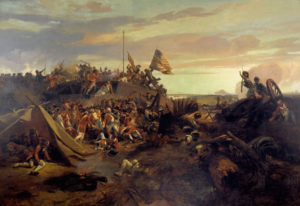 The Americans began digging trenches, in coordination with the French, on the outside of Yorktown. A redoubt is a three sided fort with sticks tied together with a moat around it. The Americans, following the book on how to advance in concentric circles, get closer each night. Washington fires the first gun and then they fire on the British. General Nelson fires the first gun on his own house used by the British. On October 14, four hundred French troops were sent against Redoubt 9 (Rochambeau); with four hundred American troops sent against Redoubt 10 (Hamilton). Hamilton takes his redoubt in only 10 minutes of fierce hand to hand combat. Now Cornwallis faced French and Americans at point-blank range.
The Americans began digging trenches, in coordination with the French, on the outside of Yorktown. A redoubt is a three sided fort with sticks tied together with a moat around it. The Americans, following the book on how to advance in concentric circles, get closer each night. Washington fires the first gun and then they fire on the British. General Nelson fires the first gun on his own house used by the British. On October 14, four hundred French troops were sent against Redoubt 9 (Rochambeau); with four hundred American troops sent against Redoubt 10 (Hamilton). Hamilton takes his redoubt in only 10 minutes of fierce hand to hand combat. Now Cornwallis faced French and Americans at point-blank range.
The final providence we note is that this battle brought victory. Though Cornwallis attempted to escape (and was foiled by the weather), he couldn’t continue and surrendered. Even the British noted that Providence was agianst them. George Washington wrote “The General congratulates the army upon the glorious event of yesterday… Divine service is to be performed tomorrow… The Commander-in-Chief recommends that the troops not on duty should universally attend with that seriousness of deportment and gratitude of heart which the recognition of such reiterated and astonishing interpositions of Providence demand of us.”
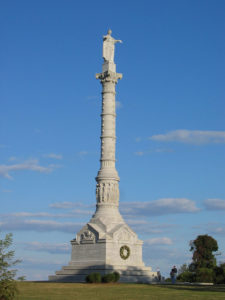 During the surrender, Washington demanded the British flags to be cased due to the way they had treated American soldiers, and they surrendered while The World Turned Upside Down was played. Cornwallis refused to attend and so Washington had Benjamin Lincoln, so disrespected by the British, do the honors. Several thousand British threw down their arms in anger before boys and farmers who had defeated the greatest army in the world! The Victory Monument, dedicated in 1881 on the centennial commemoration was intended to convey “in architectural language… the victory at Yorktown, (where) the independence of the United States of America was achieved.”
During the surrender, Washington demanded the British flags to be cased due to the way they had treated American soldiers, and they surrendered while The World Turned Upside Down was played. Cornwallis refused to attend and so Washington had Benjamin Lincoln, so disrespected by the British, do the honors. Several thousand British threw down their arms in anger before boys and farmers who had defeated the greatest army in the world! The Victory Monument, dedicated in 1881 on the centennial commemoration was intended to convey “in architectural language… the victory at Yorktown, (where) the independence of the United States of America was achieved.”
So what can we learn? When the Pilgrims set sail in 1620 to arrive on the shores of New England, they had been brought into unity, embraced the character of humility, and had “strangers” who had been joined to their bold venture so that they could accomplish their goal of planting a colony in the new world that would be “stepping stones unto others” in “advancing the Kingdom of Christ in those parts of the world.” Whether it is the Pilgrims, or our own personal battles and those that involve our churches, towns and communities, we must have the same ingredients, with noble goals that transcend us our own egos so that God receives all the glory. In all, it is important to remember the injunction of Scripture; “those who honor Me I will honor.” (1st Samuel 2:30).







